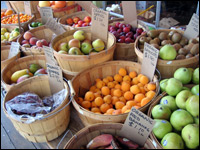
Louella Hill.
What work do you do? What’s your job title?
I am the director of a program called Farm Fresh Rhode Island. For my work with Brown University Dining Services, I call myself the “Local Food Ambassador.”
What does your organization do?
At Farm Fresh Rhode Island, we connect local eaters with local food producers. By encouraging a localized food system, we save thousands of “food miles.” (The average item of food on the American dinner plate travels 1,600 miles between where it is grown and where it is eaten.) Buying local food preserves open space by keeping farms viable. Buying locally grown foods means eating fresher, more flavorful, more meaningful food.
What do you really do, on a day-to-day basis? What are you working on at the moment?
I encourage people at every link in the food chain (farmer, wholesaler, processor, buyer, restaurateur, chef, eater) to support local food producers. My days are filled with setting up farmers’ markets, advising menu writers, building a web-based directory of local production, planning special events (Providence’s Perfect Pickle Contest is coming up Oct. 3), taking people on farm tours, helping farmers unload their trucks, painting signs that say: “Buy Farm-Fresh Eggs,” “Taste Sun-Ripened Peaches,” and “Visit the Farm: Learn Where Your Food Comes From.”

The farmer in the sell, the farmer in the sell.
Tomorrow is the opening day for the farmers’ market I manage at Brown University. This morning I talked to a local bakery, asking them if they could make calzones with local vegetables; I talked to the police about parking; I called the goat-cheese lady. Then I attended a meeting about farm-to-cafeteria connections in Rhode Island; our goal is to get four Rhode Island public elementary schools to make at least one local food purchase this fall. I also need to mail Chef Snitzer at the Westin a list of area meat producers (lamb, beef, chicken, turkey, emu, venison, goat, pork).
What long and winding road led you to your current position?
I worked at a little restaurant named Café Roka in Bisbee, Ariz., throughout high school. It confirmed my love for food. In college, I was a server during a catered dinner. At the end of the night, while cleaning up, my supervisor asked me to throw out a sheet pan full of salmon fillets. There were 85 fat fillets and one big plastic-lined black hole. At that moment, I realized if I truly loved food, I had to know more about the systems that brought it to me. I had to work on this system so that less of it is wasted and more of it is appreciated. And at that moment, I was also fired.
Who’s the biggest pain in the ass you have to deal with?
Whole Foods. I do give them credit for educating us about many important food topics (organic, GMOs, hormone-free). I also give them credit for creating a false sense of “moral eating.”
My biggest gripe with Whole Foods — at least the one here in Providence — is that they do not carry Rhody Fresh Milk. Rhode Island has lost all but 16 of its dairy farms. As a last hope, five farmers last year formed a cooperative to market their milk under a Rhode Island label. The label has been wildly embraced by the general public. Unfortunately, these farmers cannot control their milk after it goes to the processor; their milk combines with milk from other local dairies (which may contain rBGH) in order to fill the silo. Because of the potential of rBGH, Whole Foods will not carry Rhody Fresh — even though the first sign that greets customers when they enter the store reads “Local Foods.”
Where were you born? Where do you live now?
I was born on Brewery Gulch in Bisbee, Ariz. I now live on the Westside of Providence, R.I.
What environmental offense has infuriated you the most?
Junk food in our schools. It makes me cry to think we feed the worst foods to the ones who need the best. It upsets me to no end to meet children who have never eaten a fresh vegetable in their entire life. It leads to adults who have no idea that food comes from the land and not the grocery store.
What are you reading these days?
I recently finished Ruth Reichl’s two autobiographies — Tender at the Bone and Comfort Me with Apples.
What’s your favorite meal?
I love smoky corn tortillas with fresh eggs, avocados, fried greens, and olive oil.
Which stereotype about environmentalists most fits you?
I wear patchouli.
What’s your favorite place or ecosystem?
Zacatecas Canyon in the Mule Mountains in southern Arizona (where I was born). I would take a mountain over the sea any day.
What’s your favorite band?
My favorite music includes the Be Good Tanyas, Gillian Welch, Cat Stevens, Bob Dylan, Emmylou Harris, Linda Ronstadt, The Jerimoth String Band, and anyone playing at the farmers’ market.
What are you happy about right now?
I am happy about the 35 pounds of unsprayed, local blueberries we (my partner and I) picked and froze for the winter. I am happy because a manager from Parkside Restaurant in Providence walked up to a farmer at Monday’s market and told the farmer he could drop off what he had left over after each market and Parkside would buy it. I am happy because my sister is going to have a baby in March.
If you could have every InterActivist reader do one thing, what would it be?
The next time you are at a restaurant, ask the waiter, the chef, the owner if anything on the menu is coming from a local farm. If yes, thank them. If no, ask why not.

